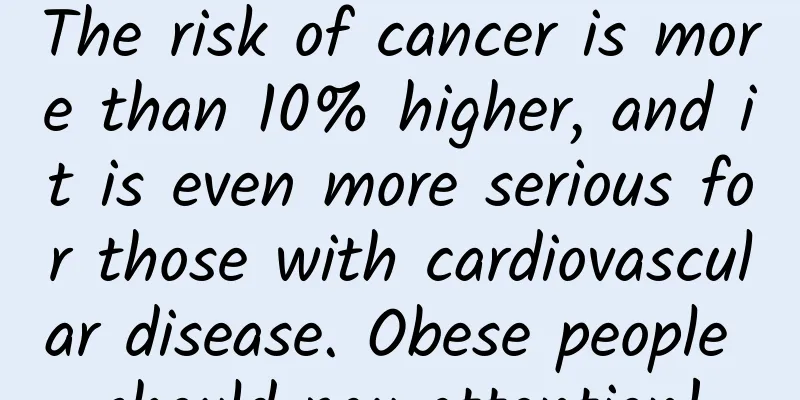The risk of cancer is more than 10% higher, and it is even more serious for those with cardiovascular disease. Obese people should pay attention!

|
Only those who are losing weight can understand the pain they feel. But losing weight does have more benefits than disadvantages for a person's physical and mental health. The latest research shows that obesity is also associated with a higher risk of cancer, regardless of whether it is accompanied by cardiometabolic disease (cardiovascular disease or type 2 diabetes). Specifically, people with a higher body mass index (BMI) have a more than 10% increased risk of developing cancer (such as colorectal cancer, kidney cancer, pancreatic cancer or ovarian cancer). If they also have cardiovascular disease, the risk of developing cancer can even increase by 17% . The research paper, titled “Body mass index and cancer risk among adults with and without cardiometabolic diseases: evidence from the EPIC and UK Biobank prospective cohort studies,” has been published in the scientific journal BMC Medicine. The study was funded by the World Cancer Research Fund. This study shows that the increased cancer risk associated with increased BMI is greater in the presence of cardiovascular disease, highlighting the importance of preventing obesity in these populations to reduce cancer risk. Obesity and cardiovascular disease increase cancer risk Data from the World Health Organization (WHO) show that nearly 2 billion adults in the world are overweight or obese. According to the "Report on the Nutrition and Chronic Disease Status of Chinese Residents" released in 2020, the overweight or obesity rate of Chinese adult residents has exceeded 50%, of which the obesity rate exceeds 16%. Previous studies have shown that obesity not only affects one’s appearance and daily life, but also easily leads to a variety of metabolic diseases . Moreover, obese people are much more likely to suffer from high blood pressure, high blood lipids, diabetes, cardiovascular and cerebrovascular diseases than people with normal weight. Related studies have also shown that a BMI above 25 is a definite risk factor for at least 13 types of cancer , including breast cancer, colorectal cancer, liver cancer, kidney cancer, pancreatic cancer and ovarian cancer in postmenopausal women. However, it is not clear whether a high BMI itself is associated with an increased risk or whether other obesity-related diseases are also playing a role. To this end, the research team used data from more than 500,000 adults to study the relationship between BMI and cancer risk in adults with or without cardiometabolic diseases. Among them, 344,094 participants came from the UK Biobank and 233,249 participants came from the European Prospective Investigation into Cancer and Nutrition (EPIC) cohort. These participants did not have cancer, type 2 diabetes (T2D) or cardiovascular disease (CVD) at the time of enrollment. Cox proportional hazards regression with multivariable adjustment was used to estimate hazard ratios (HRs) and 95% confidence intervals (CIs) for the association between body mass index (BMI) and obesity-related cancers and overall cancer. Figure | Association between BMI and obesity-related cancer risk determined by cardiometabolic disease in the EPIC and UKB cohorts (Source: this paper) At the same time, they also introduced a multiplicative interaction between BMI and two cardiometabolic diseases (CMDs). The research team estimated the HRs and 95% confidence intervals for independent and joint associations for overweight and CMD status categories and quantified the additional interaction through the relative excess risk caused by interaction (RERI). Figure | BMI and obesity-related cancer risk by cardiometabolic disease status in the EPIC and UKB cohorts (Source: this paper) Overall, for individuals without cardiometabolic disease, a 5-point increase in BMI was associated with an 11% increased risk of obesity-related cancers. Similar increased risks were observed among participants with cardiometabolic disease, with an 11% increased risk for each 5-point increase in BMI for those with type 2 diabetes and a 17% increased risk for those with cardiovascular disease. The findings suggest that higher BMI is associated with a higher risk of cancer regardless of other cardiometabolic diseases, but obese individuals with cardiovascular disease appear to have a particularly high risk of cancer. Although this study has several strengths , including analysis of individual participant data from two large European prospective cohorts, use of validated assessments for cancer, cardiovascular disease, and type 2 diabetes, and modeling of associations in a time-varying pattern, the following limitations need to be considered: The study used information on lifestyle habits and BMI at recruitment and did not consider changes in modifiable habits during follow-up, which may have led to bias. Some drugs, such as metformin, may affect weight and cancer risk, but data were collected inconsistently in the two cohorts, and EPIC did not have relevant data. Due to the exclusion of participants with missing data and the restriction of analyses to adults without CMD at recruitment, there may be selection bias affecting the generalizability of the results. The low response rate in the UKB cohort (approximately 5%) may result in participants’ economic status, risk factors, and prevalence of long-term diseases being different from the general UK population, potentially affecting the generalizability of the results. Additionally, BMI does not capture body fat distribution or differentiate between lean and fat mass, and future studies may need to use more detailed assessments of body composition to further explore the role of fat fractions in disease relationships. The EPIC and UKB cohorts were recruited at different times and the strength of the associations was inconsistent between the two cohorts, suggesting that changes in lifestyle or CMD treatment may have occurred during this period. Scientifically control BMI Although this study has certain limitations, its findings also sound a wake-up call for us. A study also published recently in BMC Medicine showed that greater adherence to the World Cancer Research Fund/American Institute for Cancer Research (WCRF/AICR) cancer prevention recommendations (which encourage a healthy lifestyle) was associated with a lower risk of all cancers and some cancers (such as breast cancer). The recommendations aim to reduce cancer risk by encouraging people to maintain a healthy weight, be physically active, and eat more whole grains, vegetables, fruits and legumes, but less highly processed foods, red and processed meats, sugary drinks and alcohol . So, in daily life, how should we scientifically control BMI? Combining the recommendations of the World Health Organization and the U.S. Centers for Disease Control and Prevention (CDC), I have summarized the following methods : Diet management : Eat a balanced diet and consume a variety of foods, including vegetables, fruits, whole grains, protein and healthy fats; eat in moderation, control daily calorie intake, and ensure that the energy intake does not exceed the actual needs; limit sugar and processed foods, reduce the intake of sugar and processed foods, and choose healthier food options. Appropriate exercise : aerobic exercise, do 150 minutes of moderate-intensity aerobic exercise per week, such as brisk walking, jogging, swimming, etc.; strength training, add strength training more than twice a week to enhance muscle mass; increase daily activities, try to increase activities in daily life, such as walking, climbing stairs, etc. Good sleep : Maintaining a good sleep pattern is essential for good health. Adults generally need 7-9 hours of sleep per night. Stress management : Long-term mental tension and stress can lead to unhealthy lifestyle choices. Learn ways to cope with stress, such as meditation, deep breathing, and exercise. Regular physical examinations : Regular health checks should be conducted, including monitoring of blood pressure, blood sugar, blood lipids and other indicators, as well as BMI. Make gradual lifestyle changes : Avoid extreme diets or exercise plans and instead adopt sustainable, gradual changes. This makes it easier to develop healthy lifestyle habits. Seek professional help : If needed, consult a doctor, nutritionist or fitness trainer for personalized advice and support. In addition, the Centers for Disease Control and Prevention also provides specific weight loss recommendations. The steps are summarized as follows: Make up your mind : Write down your motivations and goals for losing weight and use them as a daily reminder of why you want to make this change. Take inventory regularly : Record your diet, physical activity, sleep, and mood to understand current habits and stressors and examine factors in your lifestyle that may be posing challenges. Set realistic goals : Create short-term and long-term goals, focus on specific, realistic goals, and avoid setting unrealistic goals. Identify sources of information and support : Find support from family, friends, colleagues or professionals, join a weight loss group, and get advice on healthy recipes and planning group activities. Keep monitoring your progress : Review and evaluate your set goals regularly, adjust your plan, add new goals to stay motivated, and use non-food rewards to reward yourself for success. This is not just a journey about weight loss, it’s about improving your overall lifestyle. So, from now on, make up your mind to lose weight scientifically. Reference Links: https://bmcmedicine.biomedcentral.com/articles/10.1186/s12916-023-03114-z https://bmcmedicine.biomedcentral.com/articles/10.1186/s12916-023-03107-y https://www.cdc.gov/healthyweight/losing_weight/index.html https://www.who.int/news-room/fact-sheets/detail/obesity-and-overweight |
<<: Save the "disappeared her" in your mind! Can protein modification help you "remember"?
Recommend
Internet advertising measures are implemented, 70 pages of PPT analysis to teach you how to deal with them!
As an emerging advertising medium, Internet adver...
How did Zhang Xiaolong build the huge business empire of WeChat?
WeChat's business strategy has always been co...
Hacker Strategy | How to effectively and significantly increase app downloads!
For all "idealistic" developers, succes...
13 ways to promote events to take care of your 2020 annual event plan!
In 2020, will you continue with last year’s old r...
20 auto companies had debts of 809.8 billion yuan last year
In 2016, my country's automobile production a...
An event operation and promotion plan that can be used directly!
Do you still remember the NetEase opening class t...
Teammates sacrificed, first love got married, and police officer An Xin's hair turned white overnight. Can people really turn white overnight when they suffer a major blow?
"Kuang Da" has reached its finale. The ...
China Passenger Car Association: The auto industry's profit in 2022 will be 532 billion yuan, and the sales profit margin will be only 5.7%
Cui Dongshu, secretary-general of the China Passe...
Surprisingly, the accuracy of "Dog Doctor" in cancer detection is as high as 97%
The working dogs we hear more about in our lives ...
How to optimize English websites, Google English optimization suggestions
Optimizing an English site is much more difficult...
"Stomach, how are you?" "I'm not very well"
Produced by: Page Expression x Dongdong Miao...
The number of infected people has exceeded 1,000! The latest report from this place
The latest data released by the Anhui Provincial ...
Competitive product analysis of Tik Tok and Yoo Video!
Framework of this article 1. Background and Purpo...
WeChat ID can be changed at will? Official: It's just a bug
Recently, there have been a lot of news about WeC...









